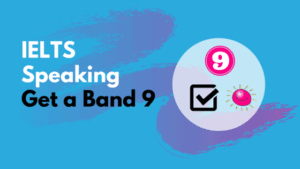Why is it important to improve your IELTS vocabulary for speaking?
Because, this is also the one area that most differentiates a band 6, 7, 8 and 9.
What’s more, the one area where you can make the biggest and fastest improvement in your speaking, is vocabulary…
…if you study it correctly!
Table of Contents
Learn how to learn vocabulary for IELTS Speaking
- Always make sure you learn vocabulary in context.
- The context shows you when and how to use the language, and also what words go together
- Word lists, idiom lists have limited use because they have no context.
- When learning vocabulary, make a note of phrases, not single words.
- Learn the collocations of the word.
- E.g. don’t just learn ‘tea’, learn ‘black tea’, ‘milky tea’, ‘a tea party’…
- As well as writing new language, you can also record phrases that you can listen to many times.
- Learn at least two synonyms for commonly used words (e.g. like, good, often…)
Extend your passive vocabulary.
You have 2 kinds of vocabulary.
- Words you recognise when you see or hear them (passive vocabulary)
- Words you can actually use when speaking or writing (active vocabulary).
You need to extend both of these in order to improve your vocabulary for IELTS speaking.
Let’s look first how to extend passive vocabulary.
It’s simple, practice passive skills (reading and listening).
- Go beyond your course book
- Read magazines, newspapers, novels, poems, recipes, blogs, anything you can get your hands on.
- Go beyond your teacher
- Listen to English everyday, including, podcasts, radio, videos, films, and even real people!
Activate your vocabulary
Now, let’s look at how to activate your vocabulary (i.e. move it from passive to active).
There are only 2 ways to do this, speaking and writing; this is why they are called the active skills!
Remember, just because you can write a word, doesn’t mean you can speak it.
You need to practice both skills.
Here are some ideas;
- Do some detailed listening; that means, listen and make notes of new language (words, phrases and idioms).
- Record the new words and phrases and listen back to them lots.
- When you listen, repeat the new words and practice making new phrases with them.
- This will let you hard-wire new vocabulary.
- It starts to fix the language in the speaking part of your brain.
- Create conversations (with a speaking partner or teacher) where you can start practicing this new language.
- This will make it a part of your everyday speech.
TIP
Remember, in the exam, you will probably use language at level somewhat lower than what you can in everyday conversation.
This is what the pressure does to you, and everyone.
So, you need your speaking to be at IELTS 7.5, in order to perform at IELTS 7 level in the exam.
Useful tools to build vocabulary for IELTS Speaking
One of my favourite tools for finding collocations is
A great online tool for recording your voice and also listening back is
If you are looking for synonyms, try
So, now you know how to start improving your vocabulary, get work!
For more tips and ideas to improve your performance in IELTS Speaking, check out the resources section of this website





24 thoughts on “Improve your IELTS Vocabulary for Speaking”
Hi Keith.How are yo?, I just met you through youtube.
My Eng is not enough good yet.
Which your course is useful for me at the first?
thank you.
Ooo and I am from Iran. I mean online courses
Hello, if you have a lower level, I would recommend trying the Fluent Grammar for IELTS course. It will give you a good foundation in grammar and pronunciation.
Sir, I like the way of speaking with smile.
It’s nice to stay happy!
Hii your lessons are awesome . I have enhanced my english from ur lessons . When ever i was demotivated I use to watch ur lessons your enthusiastic spirit gives me positive vibes thanks a lot and lots of love. You r superb mentor.
Thank you so much, and so pleased the lessons motivate you!
hi keith I’m new in you friend list, I’m very much fond of you lessons. please sugget to me how i can resolve pauses in speaking. thank you
Trying speaking really slowly when you practice, then speaking at a natural speed. Finally, try speaking quickly. In your practice, try switching between these modes. See if that helps.
hi Keith
Your course is amazing. I bough all your course and I try to follow your live lesson.
I want to know if you have streem a lesson about Bionamials
Thank you very much
Hi Rachida, thanks for your comment. I don’t think I have a live lesson on binomials. Good suggestion for the future though!
Very intersting N clear sound lessons feel comfortable to hear.
Glad you like them!
You have no equal, definitely. I am a huge fan of your classes.
So pleased to hear that – keep watching!
Really it’s amazing to me
So pleased you like it!
I got 5 band speaking I have ideas in that time but my nervous get on my mind I want improve 7 please can help me
Sure, first of all, be patient. Many people take 2 years to move up 2 bands. Secondly, make a study plan or follow a course to improve your overall level of English. Third, make study and practice of English a daily habit. Fourth enjoy your study – find materials that you like and that interest you. Finally, spend a month or so before your test focussing on exam technique. There are lots of materials on this website that can help you. Go and explore. Best wishes and good luck!
Hello,
I hope everything goes well with you, Keith.
I’m an English Instructor who follows you and your channel to level up my knowledge and transfer them to my students.
Pardon me.
Actually, I forgot the rest of my reply.
As reveal my idea, I couldn’t agree more with your tips and opinions.
All the best…
Great to hear from you – thanks for commenting.
Hello, I’m really happy for being here and even lucky enough to be in touch with your site . I came across your classes on you tube accidentally, since that time I became a regular follower of all your helpful classes . Thank you for your tireless effort to help English learners like me.
I am delighted you are here and pleased you find the content useful. Come back soon!
this is very good tip!
I want you save this post another new site too.